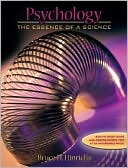

 |

|

Sold Out
Sold Out
Book Categories |
To the Student.
To the Professor.
Acknowledgments.
About the Author.
I. INTRODUCTION.
1. The World of Psychology.
Definitions.
A Brief History of Psychology.
Ancient Philosophers.
The Unconscious.
René Descartes.
Sleep and Dreaming.
Dualism vs. Monism.
Early Scientific Psychology.
Wilhelm Wundt.
Edward Titchener and Structuralism.
Gestalt Psychology.
William James and Functionalism.
Modern Schools of Psychology.
Sigmund Freud and Psychoanalytic Theory.
John B. Watson and Behaviorism.
B. F. Skinner.
Abraham Maslow and Humanism.
Latest Trends.
Neuropsychology.
Cognitive Psychology.
Jean Piaget.
Lawrence Kohlberg.
Cognitive Neuroscience.
Evolutionary Psychology.
An Illustration: Attachment.
Study Guide for Chapter 1.
2. Methods of Scientific Research.
The Measure of Measurement.
A Sample of Scientific Methods.
Correlational Study.
Cause and Effect.
Controlled Experiment.
Good Interpretations.
Meta-analysis.
Replication.
The Value of Science.
Ethics.
Study Guide for Chapter 2.
II. BIOLOGY.
3. Brain and Heredity.
Brainy Questions.
The Wrinkled Top.
Two Highways.
Split Brain Findings.
The Interpreting Brain.
Brain Geography.
Localization of Function.
Language.
Plasticity.
Brain Imaging.
Brain Cross Section.
Nervous System Organization.
Neurons.
Axonal Transmission.
Synaptic Transmission.
Neurotransmitters.
Other Brain Cells.
Heredity.
Reproduction.
The Gene.
Chromosome Abnormalities.
Nature vs. Nurture.
Study Guide for Chapter 3.
4. Sensation, Perception, and Consciousness.
The Process of Sensing.
The Human Senses.
Psychophysics.
Sensitivity.
Vision.
Eye Anatomy.
Rods and Cones.
Teamwork.
Layers of the Retina.
Perception.
Basic Principles.
How Deep Is It?
The Funny Room.
The Physiology of Perception.
States of Consciousness.
Blinded by the Light.
1. Perchance to Sleep.
2. Hypnosis.
3. Psychoactive Drugs.
Study Guide for Chapter 4.
III. COGNITION.
5. Learning.
Learning Defined.
Two Types of Behavior.
Two Types of Learning.
Classical Conditioning.
Essential Ingredients.
The Scientist Pavlov.
It Depends.
Variations on a Theme.
Developing Pavlov's Ideas.
Operant Conditioning.
The Law of Effect.
Types of Operant Conditioning.
Variations of Operant Conditioning.
Schedules of Reinforcement.
Applications of Conditioning.
Cognition.
Observational Learning.
Cognitive Maps.
The Physiology of Learning.
Study Guide for Chapter 5.
6. Memory.
The Essence of Memory.
The Search for The Engram.
Riding the Seahorse.
Three Types of Amnesia.
Two Kinds of Memory.
Types of Declarative Memory.
Types of Procedural Memory.
Three Basic Steps of Memory.
A Model of Declarative Memory.
Sensory Memory.
Short-Term Memory.
Long-Term Memory.
Mnemonics.
Forgetting.
Causes of Forgetting.
False Memories.
Flashbulb Memories.
The Biology of Memory.
Working Memory.
Hebbian Physiology.
Study Guide for Chapter 6.
IV. PERSONALITY.
7. Personality Approaches, Social Psychology, and Assessment.
Describing Personality.
Three Approaches.
1. Grouping by Types.
Judging Bods.
Answer Me This.
Types of Problems.
2. Rating by Traits.
How Many Traits?
Figuring Factors.
More Correlations.
Stability of Traits.
Sailing the Ocean.
In Other Cultures.
3. Behaviors in Situations.
Situationism.
Social Psychology.
To Lie or Not to Lie.
To Shock or Not to Shock.
To Conform or Not to Conform.
To Help or Not to Help.
Playing Prison.
Consistency Theories.
Attribution Theory.
Across Cultures.
Assessment.
Intelligence Testing.
Parisian Schools.
Calculating IQ
The Wechsler Tests.
Culture-Fair Tests.
Extreme IQs.
New Ideas.
Defining Intelligence.
Types of Personality Tests.
The MMPI.
Projecting.
Study Guide for Chapter 7.
8. Personality Theories.
Psychoanalytic theory.
Exploring the Unknown.
Pushing Things Down.
Dreams and Slips.
Mental Protection.
Personality Structures.
The Psychosexual Stages.
Carl Jung.
Erik Erikson.
Karen Horney.
Alfred Adler.
Behaviorism.
Searching for Laws.
The Basics of Behaviorism.
Social Learning Theory.
Observational Learning.
Behaviorisms Tenets.
Humanism.
The Inner Drives.
Focus on Self.
Humanisms Tenets.
Biological Sources of Personality.
Nature and Nurture.
The Heritability of Intelligence.
Double Your Pleasure.
Emotions.
Motivation.
Study Guide for Chapter 8.
V. DISORDERS.
9. Psychological Disorders.
Definitions.
The DSM.
The Concept of Syndromes.
Schizophrenia.
Misconceptions.
Describing Schizophrenia.
Subtypes.
Stages of Schizophrenia.
Causes of Schizophrenia.
Treatments for Schizophrenia.
Mood Disorders.
Defining Mood Problems.
Moods in the DSM.
Suicide.
Treatments for Mood Disorders.
Anxiety Disorders.
Anxiety Defined.
DSM Classifications.
Body Problems.
Stress.
Knowing Your Illness.
Unconscious Body Problems.
Worry, Pain, and Ugliness.
Demographics and Treatment of Somatoform Disorders.
Dissociative Disorders.
Clinical Syndromes.
Personality Disorders.
Causes of Psychological Disorders.
Social and Cultural Factors.
Study Guide for Chapter 9.
10. Therapies.
Historical Therapies.
Holes and Spirits.
Humors and the Moon.
The Rise and Fall of Hospitals.
A Magnetic Personality.
The Rise and Fall of Hypnosis.
Modern Therapies.
Medications.
Shock Treatment.
Psychosurgery.
Psychodynamic Therapies.
Humanistic Therapies.
Behavior Therapies.
Cognitive Therapies.
Trends.
Outcome Studies.
Community.
Institutions.
Organizations.
Legal Issues.
Prevention.
Study Guide for Chapter 10.
Bibliography.
Glossary.
Index.
Login|Complaints|Blog|Games|Digital Media|Souls|Obituary|Contact Us|FAQ
CAN'T FIND WHAT YOU'RE LOOKING FOR? CLICK HERE!!! X
 You must be logged in to add to WishlistX
 This item is in your Wish ListX
 This item is in your CollectionPsychology: The Essence of a Science
X
 This Item is in Your InventoryPsychology: The Essence of a Science
X
 You must be logged in to review the productsX
 X
 X

Add Psychology: The Essence of a Science, , Psychology: The Essence of a Science to the inventory that you are selling on WonderClubX
 X

Add Psychology: The Essence of a Science, , Psychology: The Essence of a Science to your collection on WonderClub |